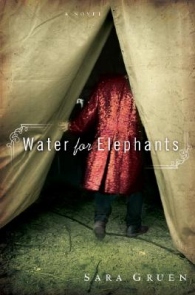Water for Elephants

A few months ago, at our local multiplex, I saw a poster of a coming attraction with an intriguing title, Water for Elephants. With a little research, I learned that Water for Elephants was a novel of some repute. It is sort of a romantic drama with the backdrop of a depression-era circus company.
Circuses are intriguing, enticing and bedazzling. I remember being enchanted as a high school boy with the Great Oriental Circus that toured the coastal AP in mid 1960s – starting with the newspaper advertisements, posters, the searchlight that scanned the skies in the late evening and could be seen in all the neighboring villages, and finally the acts themselves – gymnastics, acrobatics, trapeze, the motorcycle daredevilry and the ringmaster in control of the ferocious, roaring big cats. Everything about the circus was intriguing and we would watch them open-mouthed and talk about it for days on end.
I remember reading a particularly poignant novel by Paul Gallico (I think the title was Love, Let Me Not Hunger) in which a few members of a circus company are suddenly faced with the daunting task of keeping the animals alive in the midst of a drought. There was also The Fabulous Showman, a biography of P.T. Barnum (of the Barnum and Bailey Circus fame) by Irving Wallace, which detailed the many exploits of the legendary Barnum (he was famous for saying, “There is a sucker born every minute”). There is also a great circus movie, Cecil B Demille’s Greatest Show on Earth featuring a young Charlton Heston as the manager of the circus.
Water for Elephants begins oddly enough in a nursing home, where the physically frail but willful and obstinent Jacob Janowsky is in a wheelchair waiting for the obligatory weekly visits by members of his extended family. When a circus company pitches its tent in the lot opposite the nursing home, Jacob, a retired veterinarian, is reminded of his days with the Benzini Brothers Circus. The novel juxtaposes scenes of Jacob’s present with his past.
At the height of the Great Depression, Jacob was about to take the final exams at the veterinary school at Cornell when he gets the news that his parents were killed in an automobile accident and that he has become a penniless orphan. A distraught Jacob takes off, abandoning his studies. He jumps a train during the night. It just happens to be a circus train. An old circus hand nicknamed Camel helps him get a job in the Circus as a laborer. He gets to share the cabin of Walter the clown, a classics reading dwarf whose antagaonism to Jacob fades slowly. In a fairly short time, Jacob moves up in the social strata of the circus as he gets taken in as a veterinarian by the Circus’s chief animal trainer August. August, a great charmer, has a mercurial temperament and exhibits streaks of viciousness. Jacob falls in love with Marlena, the beautiful wife of August and the star of the equestrian show.
The owner of the Benzini Brothers Circus is the wily Uncle Al, whose goal in life is to surpass the Ringling Brothers as the premier circus. He is willing to go to any lengths to achieve his dream. When he gets a chance to add an elephant to his show, he does so with a surprising alacrity, spending a vast sum in a tight economy. It falls to August and Jacob to train Rosie, the elephant, which for all practical purposes proves to be stupid and obdurate. Jacob discovers that Rosie is not stupid; it is smart enough to pull up its stake in the middle of the night, drink all the lemonade intended to be sold to the customer s next day, and then put its stake back in the ground. There was nothing wrong with Rosie except a language problem. With Jacob’s help, August and Marlena develop a new act for Rosie.
Things begin to get complicated as August becomes suspicious of Jacob and Marlena. She leaves August and reciprocates Jacob’s love for her. This makes August furious. In the meantime, the circus’s finances begin to dwindle and the laborers and performers are not being paid. Uncle Al resorts to ‘red lighting’ a euphemism for throwing unwanted staff off the train during midnight. Camel gets afflicted with a neurological condition and Jacob and Walter are trying to hide him in their cabin. One thing leads to another and terrible things begin to happen.
Water for elephants is remarkable o many counts. It paints a detailed picture of the behind the scenes happenings at a circus in the midst of the great depression. The author meticulously researched the logistics of how a circus runs and presents those facts to us, some at a time in a very interesting manner. There is a lot of circus lore, interesting and bizarre things that apparently had a basis in real-life. Many interesting photographs of circuses from the past enhance the book.
The book works well as interesting fiction. It is a romance drama with some surprising twists and turns. It has several interesting and memorable incidents and characters. There is a mesmerizing scene describing an act between Rosie the elephant and Marlena. The author skillfully interweaves the present and the past. I haven’t read anything from Sarah Gruen before; she has a good facility of expression and I will probably check our her earlier books.
Water For Elephants is a good read, especially for those interested in dramas with a dash of romance or in the intricacies of the inner workings of a circus.
Water for Elephants
Sara Gruen
2006
Algonquin Books of Chapel Hill




నేనూ, పుస్తకాలూ, రెండువేలపన్నెండూ … | పుస్తకం
[…] circus employees, the love affair with the co-performer and wife of a abusive animal trainer etc. Here is an introduction to the book. This story is made into a movie with the same […]